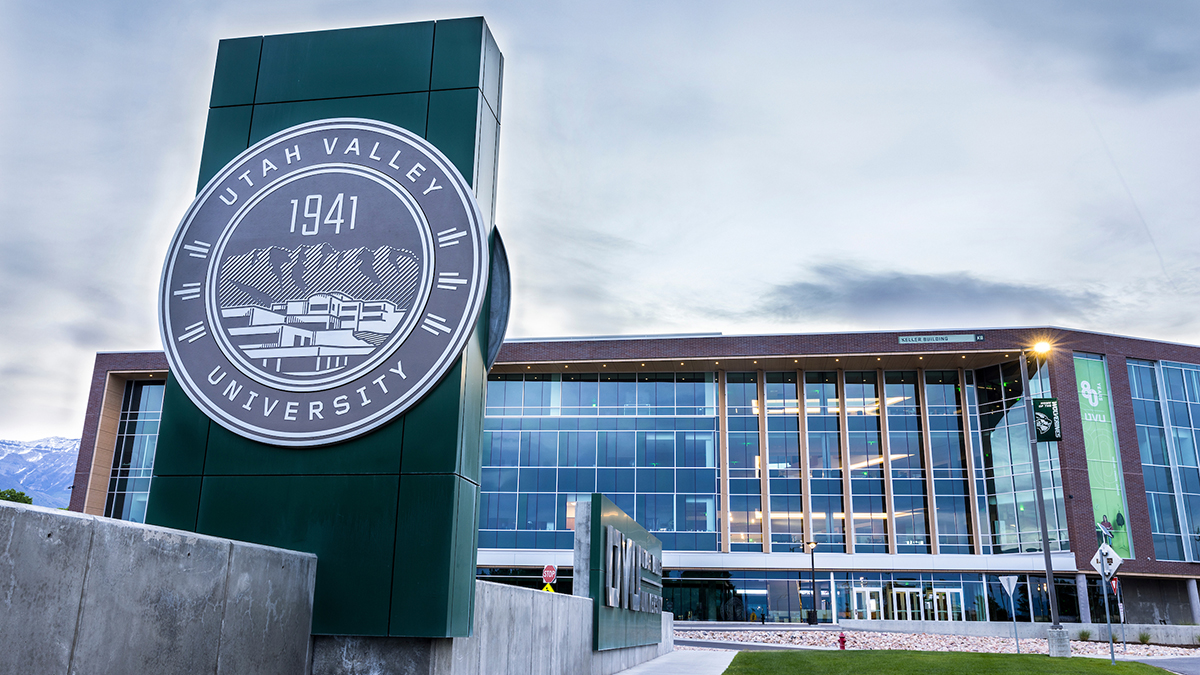The Office for Global Engagement hosted the Academic Freedom Symposium on March 28, 2024, at Utah Valley University.

Utah Valley University’s Office for Global Engagement hosted the Academic Freedom Symposium on March 28, featuring displaced scholars who have experienced the erosion and erasure of academic freedom. Common among their experiences was the conviction that to sustain a free and prosperous society, scholars and students must be unrestricted in their pursuit of research and expression of ideas — even if those ideas run contrary to dominant ideologies.
The symposium began with keynote speaker Lily Gray, Senior Liaison Officer at UNESCO, who shared the organization’s vision and their progress in advancing the cause of academic freedom internationally. Gray invited attendees to access UNESCO’s Recommendation, a global standard-setting instrument that lays out how education should be used to bring about lasting peace and foster human development.
Dr. Uzeyir Ogurlu, assistant professor in UVU’s School of Education, shared his presentation on academic freedom, specifically as he experienced its decline in his home country of Turkey. He explained that following the failed coup attempt in 2016, Turkey’s President Erdoğan responded by reshaping the country through emergency decree laws. These laws displaced or imprisoned 60,000 students and 8,535 academic personnel. Universities were no longer allowed to appoint their own presidents, and 15 universities closed. “I know how a lack of academic freedom feels,” Dr. Ogurlu said. “Without academic freedom, we cannot produce science. The first step to producing science as scholars is we need to feel safe to produce conflicting ideas or perspectives.”
Dr. Amna Afreen, of the Public Schools in Baltimore City, delivered her research and personal experience regarding academic freedom in Pakistan. She witnessed the assassination of colleagues and tutors, survived a gunshot wound, and received multiple threats on her life. Because it was unsafe for her to continue to live and work in Pakistan, Dr. Afreen came to the United States through the Scholars at Risk program. She explained how “political operators who weaponize religious conservatism to enhance their own power” create “a system that permitted them to perpetuate themselves in power, never permitting true democracy to thrive.”
Dr. Gülnar Eziz, Preceptor of Arts and Sciences at Harvard University, began by explaining that she is from China but she is not Chinese. Dr. Eziz is Uyghur, a Turkic ethnic group native to Central and East Asia. “I will tell my nation’s story,” said Dr. Eziz, before sharing a brief overview of Uyghur’s unique culture and the ways in which the Chinese Communist Party (CCP) is erasing that culture. According to Eziz, there are roughly 500 Uyghur scholars and students being held in what she called “re-education camps.” She cited that even Uyghur scholars seeking to promote cross-cultural exchange and dialogue are being punished, setting “a dangerous precedent for Uyghurs seeking to understand the world they live in.”
“In order for academic freedom to exist, faculty and students need to feel safe. They need to feel safe to be who they are, express who they are, and to talk freely about their ideas and beliefs.” -Dr. Blair Bateman
Dr. Blair Bateman, Professor of World Languages and Culture at the University of Utah, brought a local perspective on the state of academic freedom in Utah. He shared his experience as a gay professor of 19 years at Brigham Young University (BYU). “In recent years, I began to feel increasingly unsafe,” Dr. Bateman said. “I began to feel that everything I said and did, both in public and in private, would come under intense scrutiny by the university.” He shared the stories of colleagues who similarly were monitored and scrutinized for expressing ideas, even in private, that could be construed as “insufficiently loyal.” After moving to the University of Utah, Dr. Bateman cited other threats to academic freedom on the state level, pointing to the recent laws prohibiting diversity, equity, and inclusion programs, and trans-exclusionary bathroom bills that affect state schools.
“Academic freedom is essential to quality education, quality teaching, and quality research.” -Dr. Uzeyir Ogurlu
“We should have respect for scholars even if their research findings are in conflict with prevailing traditions.” -Dr. Amna Afreen
“In erasing and stifling Uyghur scholarship, Uyghur people lose their agency, lands, religion, history, and collective memory.” -Dr. Gülnar Eziz
"For academic freedom to exist, faculty and students need to feel safe. They need to feel safe to be who they are, express who they are, and talk freely about their ideas and beliefs.” -Dr. Blair Bateman